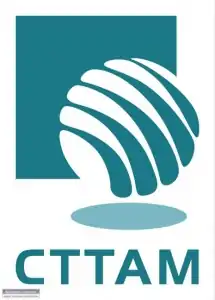Certified Technicians and Technologists Association of Manitoba
The Certified Technicians and Technologists Association of Manitoba (CTTAM) is Manitoba's independent certifying body for engineering/applied science technicians and technologists.
 | |
| Founded | 1965 |
|---|---|
| Focus | Certification of engineering technicians and technologists |
| Location | |
Area served | Manitoba |
| Method | National Technology Benchmarks |
Members | 3300 |
Key people | Ted Protosavage, C.E.T., P.Eng., Current President, Josee Remillard, C.E.T., President Elect, Andrew Procca, C.E.T., Past President, Robert Okabe, C.E.T., IntET(Canada), F.E.C.(Hon), CEO & Registrar |
Employees | 3 |
Volunteers | 30 |
| Website | www.cttam.com |
| member of Technology Professionals Canada | |
CTTAM confers the post-nominal designations of C.Tech. (Certified Technician), and C.E.T. (Certified Engineering Technologist) which are symbols of achievement in engineering/applied science technology and are legally protected for use only by fully certified members in good standing. The designations are recognized across Canada by many employers and other engineering professionals through the efforts of provincial associations that make up the Technology Professionals Canada (TPC). The Canadian Council of Technicians and Technologists (CCTT) being a signatory to the International Engineering Alliance (IEA), the Certified Engineering Technicians and Technologists Association of Manitoba recognizes international transferability through the Sydney Accord, the Dublin Accord and the Engineering Technology Mobility Forum, which confers the ability to award the designation IntET (Canada) for Technnologists who wish to work internationally.
The Certified Technicians and Technologists Association of Manitoba, under the name Manitoba Certified Technicians and Technologists (MANCETT), was established in 1965.
Certified Engineering Technologists are bound by a specific code of ethics and rules of professional conduct.[1]
The association is mandated and empowered by the Certified Applied Science Technologists Act of Manitoba[2]
Although certification is voluntary, some employers will require it.[3]
M-License
In 2006, the legislation regarding electrical work changed. Now, all electrical workers must be licensed.
Certified members in the field of Electrical, Instrumentation, Electronic, Communication, Computer, Biomedical and Mechanical can be granted a M-license limited license to practice electrical work, once certain criteria are met.[4]
There are 3 levels of license available: A limited construction license which can be attained after 5400 hours of documented construction work, a maintenance license which can be attained after 3600 hours of documented maintenance work, and a maintenance/builder license.[5]
Activism and lobbying
CTTAM is actively involved with lobbying for the interests of technologists in Manitoba.
CTTAM, in cooperation with the Association of consulting Engineering companies (ACEC), Engineers Geoscientists Manitoba and representatives from the insurance industry, is lobbying to reduce the ultimate limitation period for civil actions in Manitoba.[6]
CTTAM has contributed to local colleges, including Red River College, Assiniboine Community College and University College of the North.[7]
References
- "Archived copy". Archived from the original on 2013-12-25. Retrieved 2013-12-24.CS1 maint: archived copy as title (link)
- THE CERTIFIED APPLIED SCIENCE TECHNOLOGISTS ACT of Manitoba.
- http://www.cirl.org/documents/en/engineering_technologist_manitoba.html Archived 2013-12-28 at Archive.today Occupation: Engineering Technologist
- https://cttam.com/Public/Registration/Current_Member/M-T_Limited_Licence/Public/Registration/M-T_Limited_Licence.aspx M Licence
- https://cttam.com/common/Uploaded%20files/M-T%20License/Classifications%20with%20Descriptions%20and%20Hours%20Required.pdf Licence Classifications and Hours
- http://acec-mb.ca/about Association of consulting Engineering companies (ACEC)
- https://www.rrc.ca/files/file/development/2012AnnualDonorReport.pdf%5B%5D Red River College donor report